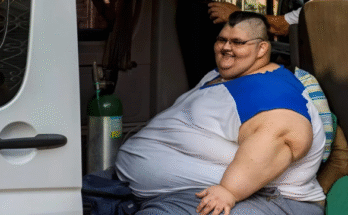
Vanessa Gomez had spent 15 years behind the phones at the Pinos Verdes County emergency center. She thought she’d heard it all—heart attacks, car crashes, fallen trees. But the call that came through at 2:17 p.m. on a quiet September afternoon stopped her cold.
“911, what’s your emergency?” Vanessa’s voice was steady, professional—trained for chaos.
For three long seconds, there was only silence. Then, a small, trembling voice broke through the line, laced with fear and muffled sobs:
“It was my dad… and his friend. Please… help me.”
Vanessa sat bolt upright, fingers poised over the keyboard, adrenaline flooding her veins.
“Sweetheart, are you hurt? Can you tell me your name?”
“My name is Liliana. I’m eight,” the little voice quivered, fragile and broken. “My tummy… it hurts. Really, really bad. He’s big… and still growing.”
Vanessa’s pulse spiked. Big and still growing? What did that mean? She strained to listen—and caught the faint sound of a cartoon jingle playing in the background. Mexican cartoons. No adult voices. No footsteps. Just a child and a television.
“Liliana, honey, where are your parents?” Vanessa kept her voice soft, steady.
“Mom’s sleeping… ‘cause her body’s fighting her again. Dad’s at work.” The little girl’s words cracked with a whimper. “I think… what they gave me… made me sick.”
Vanessa shot a glance at her supervisor, signaling for backup while forcing calm into her tone.
“Sweetheart, what do you mean? What did your dad and his friend give you?”
The answer came in a whisper that chilled her to the bone.
“Food. And water. But after they came over… my tummy started hurting… like hell.”
Liliana’s breathing grew fast—ragged and shallow, every exhale like a cry for help.
“And now she’s all grown up… and nobody wants to take me to the doctor.”
Vanessa’s stomach tightened at the child’s words. She masked her fear with calm professionalism, signaling dispatch for immediate assistance. Officer José Lopez was already en route to the location Vanessa had traced.
“Liliana, sweetheart, can you look out the window for me? A police officer is coming to help you. His name is Officer Lopez—he’s very kind, and he’s going to make sure you’re safe, okay?”
On the other end, Vanessa heard soft footsteps, then a tiny sigh of relief.
“The patrol is here… He’s going to heal my tummy.”
Vanessa forced her voice to stay steady. “He’s going to help you, Liliana. Stay on the phone with me until you hear the knock, then open the door, okay?”
Outside, Officer Lopez pulled up to a small, weathered house on Arce Street. The paint on the window frames peeled like curling paper, and the yard was overgrown—yet, by the steps, bright flowers bloomed in mismatched buckets. Someone, at some point, had tried to bring beauty into this place.
When the door opened, Lopez’s breath caught despite his years of training. Standing before him was Liliana—a fragile silhouette in the dim hallway. She was painfully small for eight years old, her blond hair twisted into uneven pigtails. Her eyes, far too big for her thin face, held a depth of fear that no child should ever know.
What struck Officer López hardest wasn’t the uneven pigtails or the hollow cheeks. It was her belly—round and unnaturally swollen beneath a faded blue T-shirt, the fabric stretched tight over fragile ribs.
“Hello, Liliana,” he said softly, lowering himself to her eye level. “Can you show me what’s hurting you?”
With trembling hands, Liliana lifted the hem of her shirt just enough for him to see. Her small abdomen bulged grotesquely, the skin taut, as if her tiny body carried something it was never meant to.
“It was Dad… and his friend,” she whispered, tears sliding down her cheeks. “They did this to me.”
López felt the words slam into him like a physical blow. Fighting to keep his voice even, he called for an ambulance. Across the street, behind a curtain of lace, an elderly neighbor watched with sharp, prying eyes. She reached for her phone, ready to unleash a storm of whispers that would soon tear through the entire town.
Inside, López settled on the worn floral sofa, notebook in hand, though his gaze never left the fragile child in front of him. The living room told two stories—one of struggle, one of love. Bills stacked like fallen leaves on the coffee table. Empty pill bottles scattered in the kitchen. Unwashed dishes in the sink. Yet the walls bore colorful drawings in crayon, a knitted blanket softened the armchair, and smiling faces beamed from family photos—snapshots of better days.
“Liliana, sweetheart, can you tell me more about what happened?” López’s voice was steady, but his knuckles whitened around his pen.
The little girl hugged a threadbare teddy bear tight, as if it could shield her from everything ugly in the world.
“My tummy started hurting two weeks ago,” she murmured. “At first… just a little. But then it got worse. So much worse.” She touched her distended belly with a wince. “Now it hurts all the time.”
“Did you tell your parents?” López asked gently.
Liliana nodded, her eyes dropping to the floor.
“I told Dad. I told him lots of times. He said…” her voice faltered, breaking like thin glass, “‘We’ll go to the doctor tomorrow.’ But… tomorrow never came.”
Her small shoulders shook. “He was always too busy. Or too tired.”
Officer José López scribbled in his notebook, keeping his tone gentle.
“And what about your mom, Liliana?”
The little girl’s fingers toyed nervously with the ear of her teddy bear.
“Mom has… special days when her body fights against her,” she said softly. “That’s what Dad calls it. She stays in bed a lot and takes medicine… but it doesn’t always work.”
López’s heart tightened. He nodded slowly, then asked,
“And you mentioned your dad’s friend. Can you tell me about him?”
Liliana’s brow furrowed in concentration.
“Mr. Raimundo comes over sometimes. Last week… he brought groceries. He made me a cake.” Her voice trembled. “After I ate it… my tummy started hurting really bad.”
Before López could ask more, the sound of boots on the porch announced the arrival of the paramedics. Tina Hernandez and Marcos Torres stepped in, their presence warm and reassuring. Tina knelt in front of Liliana, her voice soft as a lullaby.
“Hi, honey. I heard your tummy’s not feeling well. Is it okay if I take a look?”
Liliana nodded, clutching her teddy bear tighter. While Tina gently examined the child, Marcos pulled López aside, lowering his voice.
“Any sign of the parents?”
“Not yet,” López replied grimly. “Mother’s apparently bedridden—chronic condition. Father’s at work. I’ve got units out looking for both.”
Marcos’s brow arched slightly, but his voice stayed calm.
“And the girl?”
“She thinks this started after something her stepfather and his friend gave her.”
A muscle ticked in Marcos’s jaw, but he stayed professional.
“We’ll get her to Pinos Verdes General—Dr. Elena Cruz is on call. Best pediatric specialist we have.”
As they secured Liliana for transport, her small hand suddenly reached for López’s. Her grip was surprisingly strong for someone so fragile.
“Wait… Mom’s gonna be scared if she wakes up and I’m not here.”
López crouched down, voice steady.
“I’ll leave her a note, and we’ll find her as soon as possible. Is there something special you want me to tell her?”
Liliana hesitated, her lips trembling. Then she whispered,
“Tell her… it wasn’t her fault.”
Those words struck López like a knife to the chest. He swallowed hard, promising,
“I’ll tell her. I swear.”
As the ambulance pulled away, siren wailing, López stood frozen on the porch. It wasn’t her fault. The phrase echoed in his mind like an ominous riddle. Something was very wrong here.
Determined to find answers, he stepped back inside the house. The kitchen told its own quiet story—crumbs on the counter, a sink of dirty dishes, and a calendar tacked to the wall. His eyes landed on the handwritten notes crowding the dates: long work shifts, names, and numbers. Pieces of a puzzle he had no choice but to solve.
Miguel: 7 a.m., 3 p.m., gas station, 4 p.m., 10 p.m., grocery store.
The scrawled notes on the kitchen calendar mapped out exhaustion, not malice. By the refrigerator, a photo spoke louder than words—a man with weary eyes, his arm draped protectively around Liliana, and beside them a pale woman whose frail smile could only belong to Sarai, the mother.
Officer López was about to check the bedrooms when his radio crackled to life:
“López, we’ve got Miguel Ramírez. He’s at the convenience store on Main Street. Says he needs to know what’s going on. Word’s spreading fast—something about his little girl calling 911.”
López exhaled sharply. Of course. In a town like Pinos Verdes, gossip traveled faster than the squad cars, and accuracy was always the first casualty.
At the small convenience store, Miguel was stacking sodas into a refrigerator when the patrol car slid into view. His gut clenched instantly. Something had happened—something bad. His first thought wasn’t even Liliana. It was Sarai.
The bell above the door chimed as Officer López stepped inside, his expression unreadable. Miguel froze, a can of cola suspended in midair.
“Mr. Ramírez?” López’s voice was firm but not unkind. “I need to talk to you about your daughter, Liliana.”
Miguel felt the blood drain from his face. The can slipped from his fingers, landing with a dull thud.
“Liliana? What—what’s wrong with Liliana?”
“She called 911 earlier today. She’s at Pinos Verdes General now. Significant abdominal distension,” López said carefully, watching Miguel’s reaction like a hawk.
Miguel’s hands began to shake uncontrollably. His voice cracked as he whispered,
“Oh God… Liliana. I—I kept telling her we’d go to the doctor. Tomorrow, I said. Always tomorrow. But—”
He swallowed hard, guilt clawing its way up his throat.
“With Sarai’s medical bills… two jobs… I just…”
And then Miguel froze. His eyes widened as something in López’s tone hit him. Something beyond medical terms. A warning.
“Wait.” His voice was barely audible. “What… what happened to her, Officer?”


